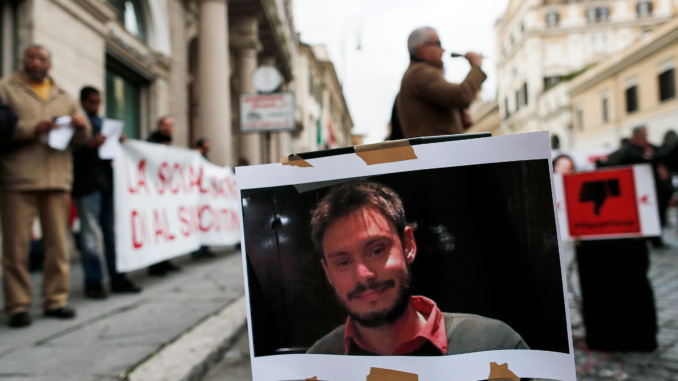
Eight years later, the perpetuator of the heinous act against the Italian scholar Giulio Regeni remains at large, evading justice for the brutal slaying. However, the memory of the murdered student lingers prominently in his homeland, where a recent legal proceeding has been initiated.
In a fresh trial unveiled on Tuesday, Italy is once again fervently pursuing justice for its lost academic, Giulio Regeni. The young scholar was forcibly seized, subjected to torture, and ultimately met his demise in Cairo in 2016, having been mistakenly identified as a foreign intelligence operative.
Regeni, a doctoral candidate at the esteemed University of Cambridge, was in Cairo delving into the intricacies of Egypt’s autonomous trade unions—a profoundly delicate subject in a nation where the authoritarian regime has ruthlessly suppressed unofficial protests since 2013.
Disconcertingly, on the third of February 2016, a mere nine days after his mysterious disappearance, the lifeless and partially unclothed body of the 28-year-old researcher was discovered in a ditch on the outskirts of the capital. The grim scene exhibited stark evidence of severe torture—fractured bones, stab wounds, cigarette burns, and bruises.
This case has significantly strained diplomatic relations between Italy and Egypt, and even after eight years, a resolution remains elusive.
Following an extensive investigation, Italian prosecutors identified four Egyptian security officials as suspects in Regeni’s murder: General Tariq Sabir, Colonels Athar Kamel and Uhsam Helmi, and Major Magdi Ibrahim Abdelal Sharif.
Despite this, Italian prosecutors have faced obstacles in bringing these suspects to justice. In December 2020, Egyptian public prosecutors absolved all four individuals of any responsibility in Regeni’s murder, a decision vehemently contested by Italy.
A trial in 2021 in Italy was dismissed abruptly because prosecutors failed to apprise the suspects of the legal proceedings against them. However, in September of the same year, the Italian Constitutional Court ruled that the trial could proceed even in the absence of the accused.
The chronicle of Regeni’s last days paints a somber picture. On January 25, 2016, he set out to meet friends in Tahrir Square, the epicenter of protests against then-Egyptian President Hosni Mubarak five years earlier. However, Regeni never reached his destination, disappearing on the same day.
Despite prompt alerts from his academic supervisors, the student remained missing for days. It wasn’t until nine days later that his lifeless body was discovered in a ditch between Cairo and Alexandria.
The investigations conducted separately by Italy and Egypt yielded conflicting results. Egyptian authorities initially proposed that Regeni succumbed to a road accident, later attributing his death to a criminal gang whose members were allegedly eliminated in a police shootout. Italy dismissed these narratives and accused Egyptian officials of deliberate misdirection.
Collaboration between Italian and Egyptian investigators faced numerous challenges, with the latter denying full cooperation in 2016. Even after pointing fingers at Egypt’s national security service, Italian officers encountered obstacles, leading to a strained diplomatic relationship between the two nations for eighteen months.
Italian prosecutors contend that Regeni was under surveillance when abducted by Egyptian security forces, likely due to his research and left-wing affiliations, possibly mistaken for a spy. The Egyptian government, in 2016, reluctantly admitted to surveilling the student.
The new trial commenced in Rome on Tuesday, adjourning to March 18. The prolonged delay in prosecuting the student’s killers, despite identifying the suspects in 2018, is primarily attributed to political sensitivities. The alleged involvement of national security officers implicates the possibility of tracing the murder back to Egypt’s President al-Sisi.
This intricate web of geopolitical dynamics has summoned President al-Sisi, former Italian Prime Minister Matteo Renzi, and other influential figures to testify at the trial in Rome. As the legal proceedings unfold, the attorney representing Regeni’s grieving parents expressed their anticipation after an agonizing eight-year wait for justice.




Be the first to comment